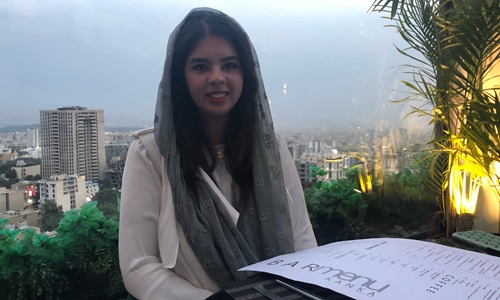Iranian girl born in Beijing: 'COVID-19 is attacking both of my hometowns'
By Ji Yuqiao Source:Globaltimes.cn Published: 2020/3/15 23:38:24

Photo: Courtesy of Fatemeh Pourani
Trailing behind China, many other countries around the world have found themselves besieged by COVID-19.
One of these countries is Iran, where a total of 12,729 confirmed cases of COVID-19 and 611 deaths were reported on Saturday by local health authorities.
Many senior officials in Iran have not escaped the reach of the virus, including Vice President Masoumeh Ebtekar, who has recovered from the disease and returned to work according to a Sunday report by Chinese newspaper People's Daily.
Fatemeh Pourani, a 22-year-old Iranian who was born in Beijing, traveled with her mother to Tehran on February 3, when the virus was spreading around China. It was the first time in a long while that she had left Beijing.
"I needed to take my mom's health into consideration while traveling," Pourani said, noting that she felt like a fish out of water after leaving the city.
But Pourani did not expect the disease to conquer Iran so rapidly.
"My two hometowns have been attacked by the deadly virus"
Isolating at home in Teheran, Pourani told the Global Times about the true life of local residents and what they think of China amid the COVID-19 outbreak.
How's daily life in Iran
Residents in Teheran have not stopped working so there is no noticeable decrease in the flow of people on the streets.
"I think Iranian people are too calm. They do not scramble for toilet paper and food in supermarkets like European or other districts' residents, which is rational, but they refuse to wear face masks. I cannot agree with that," Pourani said.
She noted that according to Iranian customs, only those who are sick should wear face masks, so if someone wears a mask, it represents that he or she has been infected.
Maybe since she was born and raised in China, Pourani has a hard time comprehending this thinking. Since wearing a mask is one of the ways to prevent the spread of viruses, she said that she hopes Iranian people can realize its importance soon.
"Although supermarkets and stores do not force people to wear masks when they go shopping, they give gloves to every customer so they may avoid the virus that may be on the goods," she explained.
Pourani, who believes in Islam, said that every Friday Muslims used to gather in local mosques for religious activities, but due to the epidemic, this tradition has been temporarily suspended.
"Some people disagreed with suspending these activities as they felt nothing should stop worship or prayer, but the religious leaders told them that nothing is more important and precious than life," she said.
As a rational believer, Pourani agrees with these leaders and supports the decision.
People's ability to show their faith is not the only thing that has been impacted. The income of many Iranian people has been devastated. March 20 is the country's Lunar New Year and most shops in Iran usually earn a large portion of their annual income during this holiday, but this year Pourani said that these shop owners will see little cash coming in due to the epidemic. No income coupled with high rents are sure to make it difficult for many stores to make it through the epidemic.
Additionally, the government has announced that tourism-related companies such as airlines and hotels must be shut down.
Thoughts on China
On February 29, China sent a medical team to Iran to help in the fight against COVID-19 by introducing China's experience in dealing with the epidemic.
Pourani said that she has already seen the influence this medical team has had on Tehran.
"Iran's medical facilities are outdated and some advanced have been imported from China," she noted.
"This time Chinese medical experts have brought both advanced medical equipment and experience, telling us to disinfect everything and reduce travel. They have encouraged local people to improve common sense about epidemic prevention.
Iran is learning from China's experience in enhancing its capacity to receive and treat confirmed and suspected COVID-19 patients.
"Basketball courts have been turned into makeshift hospitals, imitating those in Wuhan," she said.
There are also some Iranian netizens who criticized Chinese people on Iranian social media, saying that they eat everything.
However, Pourani said that she has not seen any hostile behavior toward Chinese people in real life.
Life in Beijing
Pourani has lived in Beijing for more than 20 years. Her parents decided to stay in the city after graduating from Peking University.
Pourani earned her bachelor's degree in business administration at China's Beihang University and is currently studying at the university for her graduate degree.
Over the years, she has stood witness to many changes in the capital.
Pourani recalled that when she was a little girl, there were far fewer people on the streets than there are today. There were also far fewer buildings back then.
"My deepest impression is the rapid increase in Chinese people's ability to buy things," she said.
Dozens of years ago, many people were confused as to why Pourani 's parents decided to stay in China rather than move to a more developed country. Her father would say, "Believe me, after 10 years, China will become a place all foreigners will like to come."
Naturally, Pourani speaks Chinese fluently and sounds like a Beijing resident. Although she looks like a foreigner, she feels her life in the city has made her Chinese on the inside.
"I never think to say how much I love China because it has already become so ingrained in my mind and merged with my life," she said.
Pourani said she plans to return to China in April if the situation becomes more stable and will continue her studies.
Posted in: SOCIETY,ARTS FOCUS